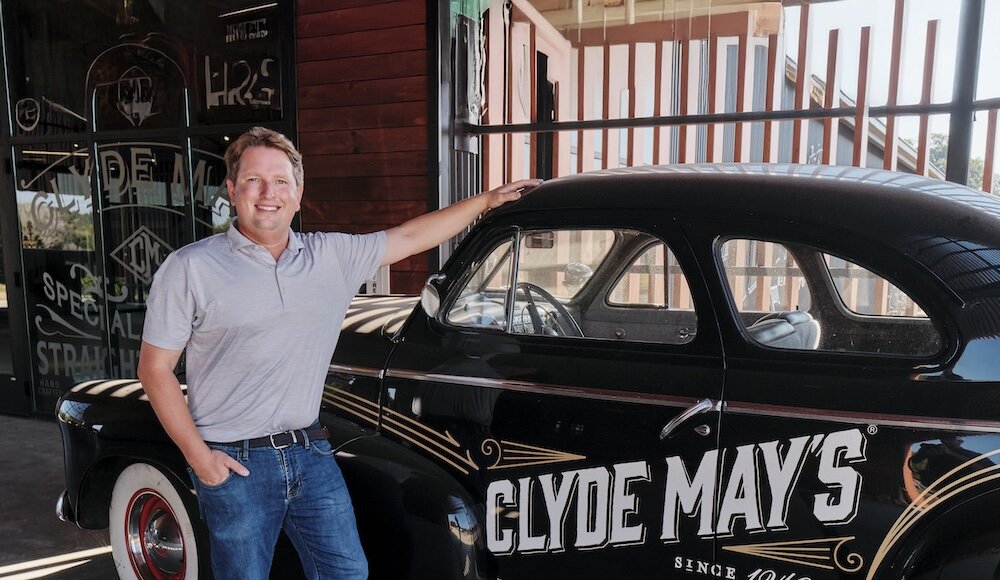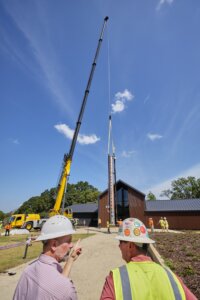
Clyde May was an unconventional whiskey man.
The 24-year-old, decorated veteran of World War II came home to Pike County in 1946 to make moonshine. Clyde May wasn’t the stereotypical “Thunder Road” story of outrunning liquor agents on country backroads to get his product to thirsty customers in the buckle of the Bible Belt.
Like most of his era, May was a hard-working, honest man, his family says, who worked full time in a variety of jobs — on a farm, and in cattle and timber. Moonshining was a side hustle to keep food on the table for his wife and eight kids, in Almeria, a community near the Bullock/Pike County line on County Road 12, known as the Rabbit Road.
“If you lived on the front end of Rabbit Road, you lived in Bullock County and if you lived on the back half, your address was Troy, Alabama,” Clyde’s grandson L.C. May says.
May’s youngest son, Billy, carried illegal whiskey making into a new generation, and now Clyde’s grandson, L.C., serves as Alabama state manager and national brand ambassador for the now-legal brand.
Clyde May was a gentleman, family members say, whose word was his bond. His grandson L.C. was born shortly after his death. But he’s heard stories.
“When he was on his deathbed, he told his children to make sure that a customer got 10 gallons he ordered,” L.C. May says. “That’s how he was. He told his children to make sure every last open order of moonshine was filled.”
Distilled spirits and the distilleries to make them, once illegal in Alabama — Clyde May spent eight months in the federal pen for moonshining — is legal since the Legislature approved them in 2013.
For several years now, the makers of Clyde May’s Whiskey have been prepping to open the Conecuh Ridge Distillery and Visitor Center in Troy.

The state-of-the-art facility will produce 600,000 gallons a year, using up to 9,000 new American White Oak barrels, filled for the first time. Those toasted and charred barrels aging gently over time, will transform the clear liquor into smooth, amber whiskey. From there, it will be bottled and shipped globally. The facility will have a maximum bottling capacity of 2,500 bottles per hour. And there’s room for expansion.
Wine Enthusiast magazine has given Clyde May’s whiskies high marks. For example, Clyde May’s Straight Bourbon Whiskey was named a bourbon “perfect for wine lovers.”
The distillery plans to add 50 jobs and is slated to also become a tourist destination featuring tours, tasting rooms, a barrel house, food trucks, a shop and a restaurant.
To get a sense of the potential economic impact, in 2022 distillery tourism in neighboring Tennessee produced a $3.45 billion impact and created 30,000 jobs, according to the Distilled Spirits Council of the United States.
For Clyde May, the very idea of a legal distillery to make his recipe would have seemed impossible. But in the early 2000s, his son, Kenny, tried unsuccessfully to convince Alabama officials to allow him to open one in the state.
Rejected, Kenny turned north. Clyde May’s whiskies, as well as other distilled spirits, were made in Indiana under the umbrella of the Conecuh Brands investment group.
But while distilleries remained illegal in Alabama until 2013, lawmakers overrode a governor’s veto in 2004 and established Clyde May’s Alabama Style Bourbon as the official state spirit.
“I believe when they made it the official state spirit, they were honoring the spirit of the man, Clyde May, versus the spirit of the whiskey,” L.C. May says.
There’s more to whiskey making than water, grain, heat, wood and time, L.C. May says.
“We are very diligent about tasting multiple batches to find the right combination that are home run products,” L.C. May says. “We take a lot of time to make sure we are honoring my grandfather appropriately.
“We care about the little things.”

The distillery will, of course, produce Clyde May’s Original Alabama Style Whiskey – Alabama’s official state spirit. It also will turn out Clyde May’s Straight Bourbon, Clyde May’s Straight Rye and Clyde May’s Special Reserve Bourbon, as well as some special release items.
The most recent offering on the company’s roster, Conecuh Ridge Bourbon, was unveiled in 2023. The name was inspired by an area where 27 natural springs come together to form creeks, inspiring the place name Union Springs.
“Some of those creeks flow right through our family property,” L.C. May says, “and they were my grandfather’s water source for making his whiskey. Those creeks flow into the Conecuh River in an area locals call Conecuh Ridge.”
The new distillery marks a homecoming, but it is about more than returning to roots.
Clyde May’s whiskey had been made in Indiana. But Conecuh Ridge Distillery brings it home.
“We wanted to bring it home to Alabama,” L.C. May says. “We wanted to bring it home to the area that Clyde May impacted when he lived in the Troy/Union Springs area. Troy made the most sense for us.”
But it was about more than coming home.
“We saw this is an opportunity, not only to bring Clyde home, but to build something special, to make something Troy and the state of Alabama could be proud of,” L.C. May says.
The brand, now in 50 states and a dozen countries, is growing.
Distillery Manager Steve May (no relation to the whiskey’s namesake) is a Rainbow City native who came to Conecuh Ridge Distillery from the Jack Daniel’s Distillery in Lynchburg, Tennessee, where he ran supply chain logistics, eventually rising to general manager. He’s spent a lifetime in the liquor business. His dad was the owner of a Gadsden bar.
“We’ve proven to ourselves … that we can compete with the big boys and girls,” Steve May says. “We feel like it’s our time.”
Even though the distillery’s equipment – mash cookers, fermentation tanks and stills — is cutting edge, tourists will bask in a warm glow of history.
Visitors will see Clyde May’s original still in the distillery’s lobby, a nod to the tried-and-true way of crafting whiskey.
As for the past, travel back to Almeria for a moment. Almeria is a community with its own colorful history beyond whiskey making. A young Hank Williams Sr. played a clubhouse there and local legend has it that Hank and his wife, Audrey, once climbed out a window to escape a brawl that erupted after a Williams show. Years later, Hank Williams Jr. recorded a critically acclaimed album in the community.
The colorful story that swirls like warm bourbon in a glass, of small towns, fistfights, country music and even a dash of jail time enriches the brand.
But country music, marketing and magical tales aren’t enough in the whiskey business. Clyde May knew that more than 75 years ago, a lesson his family has passed through generations.
“A story can only go so far,” L.C. May says. “Like my grandfather believed, your product’s got to do the talking for you.”
Paul South is an Auburn-based freelance contributor to Business Alabama.
This article appears in the November 2025 issue of Business Alabama.



